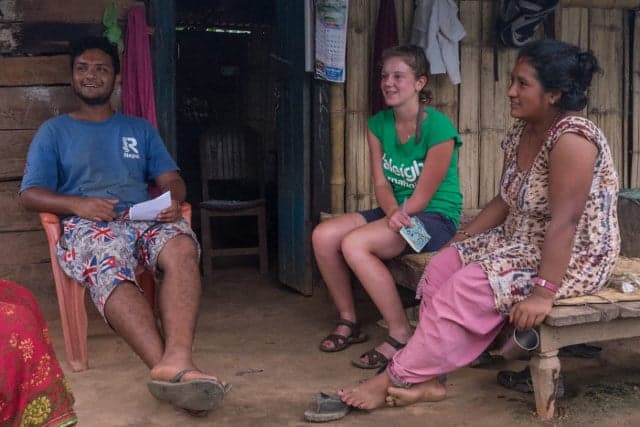Make a difference volunteering overseas in 2018
There's no better time than the start of a new year to help bring about positive change in the world. Find out why scores of young idealists are signing up to change people's lives for the better by volunteering abroad.

The New Year offers an opportunity to put last year behind us and look ahead to 2018 with renewed optimism and a fresh perspective on how to make the world a better place by making a difference in the lives of others.
And few places offer as many opportunities to bring about positive change as Nepal, the Himalayan country nestled between India and China in Southeast Asia, and home to a number of inspiring volunteer programmes run by UK-based NGO Raleigh International.
Learn more about volunteering with Raleigh International
Anish, 26, is one of the dozens of volunteers who spent several weeks living in the breath-taking mountains of Nepal as a Raleigh volunteer.
“I was super excited about the programme that Raleigh was about to run in Nepal and I wanted to be a part of it,” he says.
Nepal is among the poorest countries in the world with nearly a quarter of its population living below the poverty line. Inequality is a major challenge and Nepal is considered the fourth most climate vulnerable country in the world. In April 2015, the country suffered a devastating earthquake that took more than 8,000 lives and destroying 800,000 homes.
Due to the country’s high levels of inequality and poverty, poor and rural communities suffered most, with many losing the ability to provide even the most basic needs like food, water and shelter.
“After the earthquake I wanted to do something to help the people affected and thought this would be a good way to do so. I also wanted to build my confidence, communication and leadership skills,” says Anish.
Be a Raleigh International Volunteer in Nepal
“So, I applied for the role of Volunteer Manager with Raleigh. This is one of the best decisions I have ever taken in my life.”
Anyone inspired by Anish’s experience will be happy to learn that Raleigh is currently recruiting new volunteers for its programmes in Nepal in 2018.
Volunteers can choose to do an Expedition in Nepal this summer for five, seven, or ten weeks between July to September. Or there are places available on our autumn programmes departing between October to December.
 A Nepali village surrounded by highlands. Photo: Raleigh International
A Nepali village surrounded by highlands. Photo: Raleigh International
And Raleigh volunteers work with local communities in Nepal’s Gorkha and Makwanpur districts to help improve their lives in a number of meaningful ways, from building new earthquake-proof homes to helping provide clean water and sanitation.
As one of a very small number of volunteer organisations that have an agreement signed with the Nepali government, Raleigh volunteers and their families back home can be confident they have the government’s support and that every local community has requested the presence of volunteers.
Indeed, Raleigh International’s programmes are built on nearly four decades of experience arranging programmes to challenge and inspire young people by encouraging them to explore new parts of the globe.
And Raleigh’s commitment to delivering results extends from the communities who are empowered to develop sustainably, to the young people who are inspired to take action.
Whether you are in North America, Europe, or elsewhere, as long as you are 17-24 years old (or 25-75 years old for Volunteer Manager roles), have a valid passport, and a passion to help others, a Raleigh expedition can be the opportunity that makes your 2018 an unforgettable year of creating lasting change.
For Anish, the training provided by Raleigh combined with the hands-on experience of helping rebuild basic infrastructure in a rural village developed his skills in ways he could never have envisioned before signing up.
Discover Nepal and yourself with Raleigh International
“At first I was not a confident person at all – I was a shy guy. But gradually those fears disappeared, and I did things like leading a team and doing a presentation in front of the group,” he recalls.
Anish led a team of volunteers and quickly learned how to help motivate and teach them – things he hadn’t done before. While he admits one of his initial motivations was strengthening his CV, Anish’s experience as a Raleigh volunteer in Nepal took his life in a new direction.
“The impact has been massive in my life. I want to be more involved in the community and I want to serve the people, help the people and make them smile by doing something positive,” he explains.
“I have grown into a different person since joining Raleigh. It has changed my life.”
So, if you want to change your life and the lives of others in 2018 – or know someone else who might be interested in being a Raleigh volunteer – share this article or click on the link below to learn more.
Raleigh runs Expeditions in Nepal, Tanzania and Nicaragua & Costa Rica throughout the year.
Apply to be a Raleigh International volunteer in Nepal
 This article was produced by The Local and sponsored by Raleigh International
This article was produced by The Local and sponsored by Raleigh International
This content was paid for by an advertiser and produced by The Local's Creative Studio.

Join the conversation in our comments section below. Share your own views and experience and if you have a question or suggestion for our journalists then email us at [email protected].
Please keep comments civil, constructive and on topic – and make sure to read our terms of use before getting involved.
Please log in here to leave a comment.